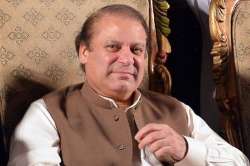Nawaz Sharif appears before Pak court in remaining 2 graft cases
On 13 August, Sharif was brought from the high-security jail in an armoured vehicle to the accountability court of Judge Arshad Malik, who is hearing the remaining two graft cases - the Al-Azizia Steel Mills and the Hill Metal Establishment case.

Pakistan's deposed prime minister Nawaz Sharif appeared before an accountability court hearing corruption cases against his family, on Monday, the first court appearance in the remaining two graft cases following his incarceration.
Sharif, 68, along with his daughter Maryam, 44 and his son-in-law Capt (retd) Muhammad Safdar are already serving jail terms of 10-years, seven years and one year respectively in Adiala jail in Rawalpindi, after an accountability court convicted them on July 6 over the family's ownership of four luxury flats in London.
On 13 August, Sharif was brought from the high-security jail in an armoured vehicle to the accountability court of Judge Arshad Malik, who is hearing the remaining two graft cases - the Al-Azizia Steel Mills and the Hill Metal Establishment case. Strict security measures were taken and authorities banned entry of the irrelevant persons in the court premises. Even media was not allowed in the court.
The pending corruption cases against Sharif and his two sons were transferred by the Islamabad High Court (IHC) on August 7 on application of Sharif to another accountability court headed by judge Malik.
Three corruption cases were filed against Sharif and family last year following a decision by Supreme Court on July 28 of the same year. The formal trial of the Sharif family started on September 14 and was to be completed in six months but later the deadline was extended at least thrice.
Apart from Sharif, his two sons –Hassan and Hussian – are also co-accused on all three corruption cases.
The court has already declared the two sons as absconders due to their persistent failure to appear before the court. They have been blacklisted by the authorities, barring them from travelling on their Pakistani passports.